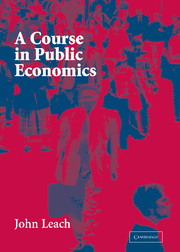Book contents
- Frontmatter
- Contents
- List of Figures
- Preface
- 1 Introduction
- Markets
- Externalities
- 6 Externalities and Negotiation
- 7 Permit Trading
- 8 Renewable Common Property Resources
- 9 Co-ordination Failures
- Public Goods
- Imperfect Competition
- Taxation and Efficiency
- Asymmetric Information and Efficiency
- Asymmetric Information and Income Redistribution
- A Note on Maximization
- References
- Index
7 - Permit Trading
from Externalities
Published online by Cambridge University Press: 06 July 2010
- Frontmatter
- Contents
- List of Figures
- Preface
- 1 Introduction
- Markets
- Externalities
- 6 Externalities and Negotiation
- 7 Permit Trading
- 8 Renewable Common Property Resources
- 9 Co-ordination Failures
- Public Goods
- Imperfect Competition
- Taxation and Efficiency
- Asymmetric Information and Efficiency
- Asymmetric Information and Income Redistribution
- A Note on Maximization
- References
- Index
Summary
Suppose that firms are emitting excessive quantities of environmental pollutants, and that the government wants to reduce their emissions. The government's policy options include taxation, direct emissions controls, and laws that require the use of specific pollution control technologies. Another policy, involving tradable emissions permits, has recently been tried. Although our experience with tradable permits is limited, some economists believe that their use avoids some serious problems associated with the other instruments:
Taxing emissions certainly reduces pollution, but policy-makers can only predict the effects of a given tax if they have detailed information about the costs of individual firms. Lacking this information, they must proceed by trial and error.
The government could require all firms to reduce their emissions proportionally. However, the costs of reducing emissions can vary quite dramatically across firms, so this approach does not reduce emissions at the least cost. Appropriate non-proportional reductions could only be implemented if the government had detailed information about the firms, and in any case, would become a “political football.”
Specifying the control technologies to be used by firms prevents the firms from adopting better technologies as they become available: they must wait for government regulations to catch up with technology. The producers of abatement technologies, knowing that new technologies will be adopted only slowly, are deterred from investigating cheaper and more effective methods of pollution control.
- Type
- Chapter
- Information
- A Course in Public Economics , pp. 113 - 122Publisher: Cambridge University PressPrint publication year: 2003



